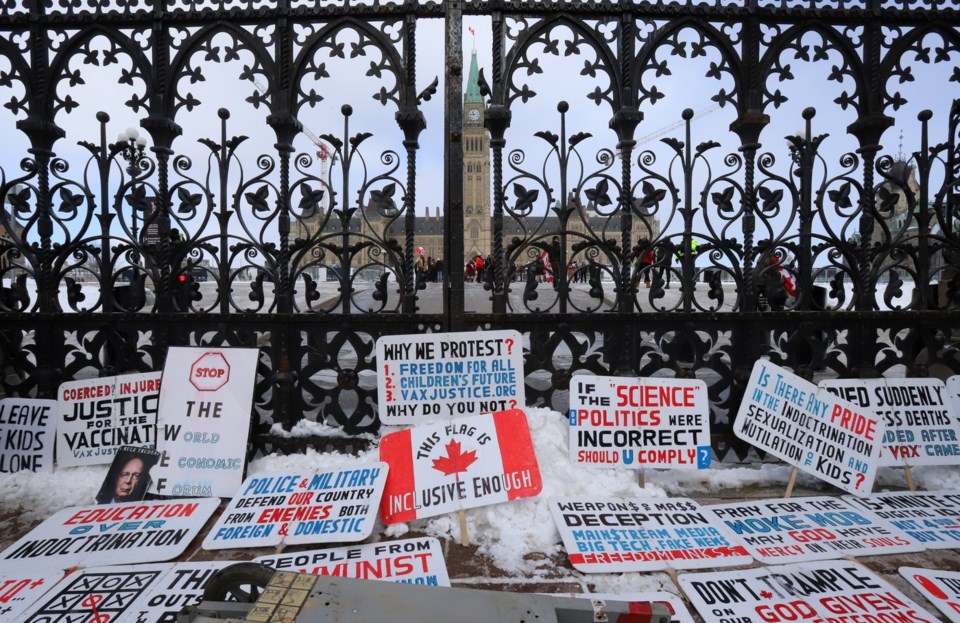OTTAWA — Senior federal officials have been looking quietly for ways to bring together Canadians who don't see eye to eye on the economy, immigration and social issues.
With a general election looming, officials prepared to meet last November to brainstorm solutions to the problem of social fragmentation, according to an internal presentation drafted by the Department of Canadian Heritage.
The presentation called on session participants to come up with ideas to make Canadian society more cohesive by reversing the trend toward polarization, building trust in government agencies and fighting the swelling tide of misinformation and disinformation.
The document offered various questions for discussion, including one asking how session participants could "position our advice on strengthening social cohesion in a way that will resonate for the next government, whatever its complexion."
The Canadian Press used the Access to Information Act to obtain the Nov. 19 Canadian Heritage presentation.
Citing three previous meetings of senior government officials since 2019, the document notes that social cohesion has been a subject of "broad and perennial interest" among federal deputy ministers.
Recent elections in other countries saw issues such as affordability, inflation, housing, immigration, racism, sexism, transphobia, diversity and false information become "divisive wedge issues," the presentation says.
It points to evidence of polarization in Canada associated with the emergence of political "echo chambers" online and in personal relationships, as well as discrimination, political bias and the spread of misinformation.
The presentation also suggests, however, that fragmentation in Canada over the last few years "has been less toxic than what has been experienced in like-minded countries."
Still, the document says officials at the November meeting planned to talk about how to ramp up efforts to "engage and 'bring back' groups veering away from democratic norms."
The presentation says an individual's trust in government strongly correlates with their last interaction with government.
"In the thousands of daily instances when somebody files a tax return, applies for a grant, renews a passport or receives a vaccine, we are creating experiences that influence their social attitudes and institutional trust," it says.
The document calls for simple, effective strategies to connect with Canadians and "streamline access to services."
It says public education is essential to countering misinformation and disinformation and calls for measures to improve critical thinking, media literacy and civic engagement.
The presentation also says there's a need to "pre-bunk" emerging falsehoods before they take hold, and to debunk lies through fact-checking.
Other ideas studied by federal officials include developing a national digital media literacy strategy, removing financial incentives that contribute to the spread of false information and introducing labelling requirements for artificially generated material.
The registered charity MediaSmarts has been pushing for a federal digital media literacy strategy for more than a decade, said Matthew Johnson, the organization's director of education.
"So it was certainly gratifying to see it mentioned in this document," he told The Canadian Press.
A national strategy would open the door to stable funding for civil society organizations like MediaSmarts, which conducts research, creates educational resources and tries to advance digital media literacy, Johnson said.
"We simply don't have the data that we need to be making decisions about digital media literacy policy," he said. "We're one of the only countries that does not have any kind of baseline of how media-literate our citizens are, either young people or adults."
The November presentation also suggests fighting fragmentation by bringing together people from different levels of government and civil society to exchange promising practices and promote a "better understanding of Canada's diverse foundations and social fabric."
But senior federal officials who discussed social divisions at a meeting last September acknowledged that government itself might be part of the problem.
The presentation says the officials recognized "there is a tension in having the public sector intervene when distrust in public institutions is on the rise."
Canadian Heritage did not answer questions submitted about the November meeting or say whether any of the ideas under consideration would be adopted.
This report by The Canadian Press was first published May 7, 2025.
Jim Bronskill, The Canadian Press




